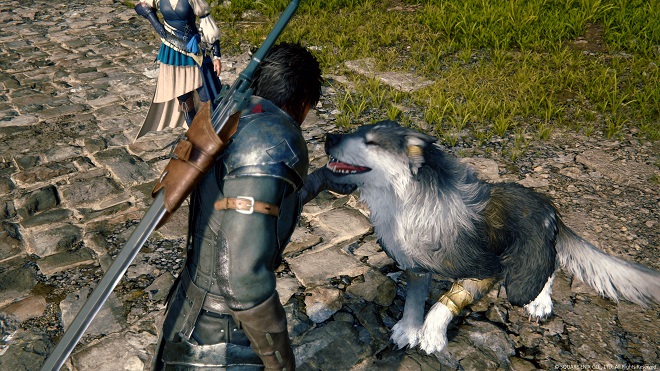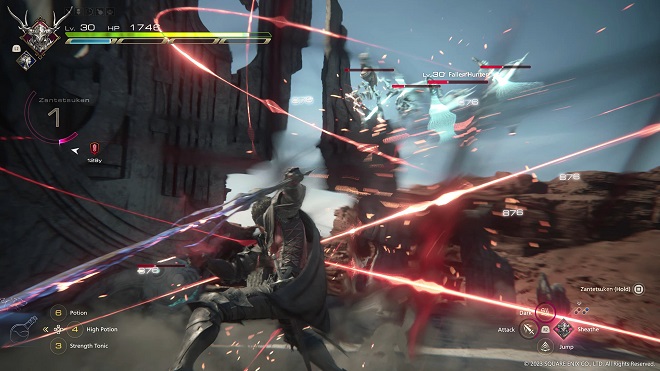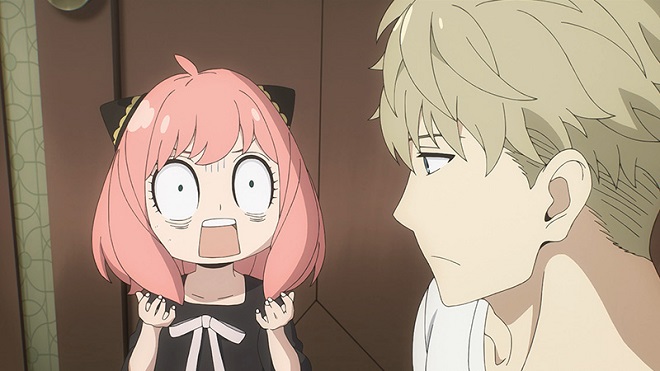Cognition Dissemination: The Most Remarkable Aspect of Final Fantasy XVI

The promotional campaign for Final Fantasy XVI has begun in earnest, chiefly shown through the enthusiast press’ video previews, the recent PAX East panel demonstration, and especially the gameplay blowout from the newest State of Play stream. Any doubt regarding what this game will be has now evaporated.
The newest title in the well-known and long-running RPG series (remember that we’re not using the “Japanese” part anymore) will embrace action further than any prior mainline title. It’s been several years since a numbered installment in the franchise could be referred to as a “turn-based title,” but this game’s action brings Devil May Cry to mind. It’s a fitting turn considering battle director Ryota Suzuki previously worked on action and fighting games at Capcom, namely as the gameplay and game design lead for Dragon’s Dogma and a designer for Devil May Cry 5. Suzuki was brought on board because this was the kind of game the team wanted to make. It looks like a fun time, though part of me would still like another turn-based title as an option.

That’s all fine, but another element is more worth highlighting: Assuming there are no unforeseen hitches over the next two months, Final Fantasy XVI will be the first non-direct sequel Final Fantasy game in a long, long time to release without succumbing to a prolonged development-hell period. It will be the first, in fact, since Final Fantasy XI: Online in 2002 over 20 years ago.
A curse befell the mainline FF brand starting with Final Fantasy XII, the first non-direct sequel (as in, not including Final Fantasy X-2) title released after Squaresoft and Enix merged. It was intended to release in either 2003 or 2004, but didn’t arrive until 2006 because of behind-the-scenes turmoil. Square Enix’s higher ups meddled with the game’s development cycle to the point that a good portion of the dev team, including lead writer Yasumi Matsuno and co-art director Hideo Minaba, left in frustration before finishing their work. Other staffers within the company had to finish the game.
The trend continued with Final Fantasy XIII, which took longer than expected because the team couldn’t figure out what direction they wanted the game to go in. This might explain why it was intensely divisive. Looking back on it, though, the three-and-a-half-year release gap between FFXII and FFXIII seemed normal compared to how long development cycles have become now.
MMORPG FFXI’s release might have gone off without a hitch, but that sure didn’t apply to Final Fantasy XIV: Online, a title launched in a bug-ridden horrendous state. It was bad enough that then-Square Enix president Yoichi Wada had to issue an apology, and producer Hiromichi Tanaka, who’d been employed at Squaresoft since the company’s inception in the 1980s, was the unfortunate scapegoat. Square Enix had to assemble a massive team within the company to nearly rebuild it from the ground up, lead by Dragon Quest X: Online planner Naoki Yoshida. This fortunately worked out with the launch of the well-received Final Fantasy XIV: A Realm Reborn.
It was Final Fantasy XV’s development that became the most drama-filled of them all. It started as Final Fantasy Versus XIII when it was announced alongside FFXIII in 2006, a more action-based alternative to the comparatively traditional sister title. As years went by, Square Enix and director Tetsuya Nomura only dropped small bits of info and gameplay videos. When it once seemed that the game was finally nearing release through a trailer released in early 2011 (shockingly still public on Square Enix’s YouTube channel after so much time), nearly half a decade after its announcement, it vanished again. That was until it was revived as Final Fantasy XV, moved to then next-generation platforms, and given to a rearranged team led by Hajime Tabata that made significant changes. It was finally released in 2016, a little over a decade after it was first announced.
As a bonus installment here: Final Fantasy VII Remake ran into a few development hitches when the team helming the game, including Nomura, shifted development from CyberConnect2 to Square Enix’s internal studio. Its production period wasn’t as turbulent as previous examples (especially FFXV), but this nonetheless resulted in a nearly five-year gap between the announcement and release.

Considering everything that’s happened with the brand’s mainline games since the merger during the PlayStation 2 days, producer Yoshida and the team behind FFXIV’s Heavensward expansion deserve kudos for developing and releasing a title in a good timeframe. Even if they’ve run into a series of unforced PR errors, like the lack of people of color in the game (and fantasy equivalents are not a replacement), this will perhaps mark the start of Square Enix having a good and healthy development pipeline for future FF titles. I hope I’m not jinxing that with this post.
This is all happening with a new mainline installment set to turn out well in terms of quality, if previews are to be believed. It will only be two months before we find out for sure.





